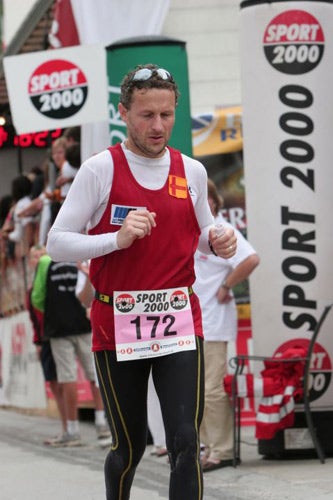The angora rabbit man who eats up the miles
Six-day races and a 127-year-old record are just a hop to ultra-runner William Sichel

Your support helps us to tell the story
From reproductive rights to climate change to Big Tech, The Independent is on the ground when the story is developing. Whether it's investigating the financials of Elon Musk's pro-Trump PAC or producing our latest documentary, 'The A Word', which shines a light on the American women fighting for reproductive rights, we know how important it is to parse out the facts from the messaging.
At such a critical moment in US history, we need reporters on the ground. Your donation allows us to keep sending journalists to speak to both sides of the story.
The Independent is trusted by Americans across the entire political spectrum. And unlike many other quality news outlets, we choose not to lock Americans out of our reporting and analysis with paywalls. We believe quality journalism should be available to everyone, paid for by those who can afford it.
Your support makes all the difference.In his day job, William Sichel hand dyes knitting yarn from the wool of angora rabbits to produce thermal clothing, including underwear, on the Isle of Sanday in Orkney. His sporting life is not so conventional.
Sichel, who is 55 but looks much younger, is ranked No 2 in the world in the six-day ultra-marathon and will next month aim to prove that "go as you please" distance records are not the preserve of eccentric Victorians.
From 3 April, he will compete in a seven-day race at the International Ultra-marathon Festival in Loutraki, outside Athens. In the first six days he will make his second attempt on Scotland's oldest athletics record, the 567 miles covered in that period by George Cameron in 1882 at an event in New York. Sichel first attempted the record last summer in a race in Hamm, Germany, which he won easily while covering 532.6 miles.
Cameron, who raced under his stage name "Noremac" (Cameron spelt backwards), set his mark on a track, and Sichel's attempt last year was on a track. The Athens event will be on the road, and the British six-day road record of 518 miles is well within Sichel's sights.
He started running "in the Eighties marathon boom", stopped when he moved to Orkney from England in 1982, and then started again in the 1990s, when time and again he clocked two hours, 38 minutes over the normal marathon distance of 26 miles 385 yards. "But I realised that I was feeling fresher at the end with each marathon," he says. "And the owner of a running shop suggested I might have the make-up for ultra-running."
He did. In 1994, in his first 100km race (62.2 miles), he won. "I found if I slowed slightly from marathon pace, I could run for hours." By 1996 he was a British international, had reduced his 100km time from eight hours to just over seven hours, and then expanded his repertoire to include 24-hour and six-day races.
Sichel's training regime on Sanday can see him out in gale-force winds that demand three layers of clothing (angora long johns included). "At Force 10, you can't run, you just stand still," he said.
Even a brush with testicular cancer in 1997 did not interrupt his running for too long. "I was diagnosed and had surgery within a week, and have been fine since."
In a six-day race, Sichel will typically take a 20-minute nap every four hours, but otherwise run non-stop. "An ability to withstand sleep loss is the key. As the days go by, your whole perception of time alters. Changing your socks can take 20 minutes instead of a few seconds."
Join our commenting forum
Join thought-provoking conversations, follow other Independent readers and see their replies
Comments